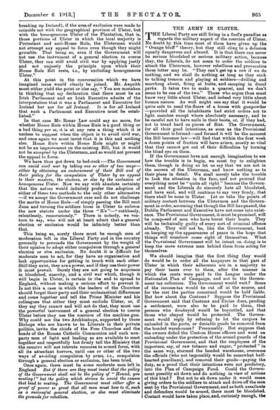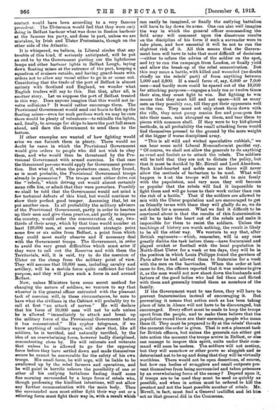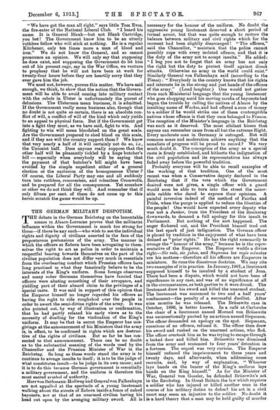THE ARMY IN ULSTER.
THE Liberal Party are still living in a fool's paradise as regards the military aspect of the coercion of Ulster. No doubt by this time most of them have given up the
"Orange bluff" theory, but they still cling to a delusion equally dangerous and absurd. It is that there can never be serious bloodshed or serious military action, because they, the Liberals, do not mean to order the soldiers to attack the Ulstermen, however rebellious and provocative these latter may be. "They can't get up a row if we do nothing, and we shall do nothing as long as they stick to talking treason and playing at soldiers—drilling and marching about, firing at butts, and camping in ducal parks. It takes two to make a quarrel, and we don't mean to be one of the two." Those who argue thus must know very little about Ulster, and indeed very little about human nature. As well might one say that it would be quite safe to sand the floors of a house with gunpowder —provided all the inhabitants had strict orders not to light matches except where absolutely necessary, and to be careful not to have nails in their boots, or, if they had, not to tread hard on pieces of flint. The Government, for all their good intentions, as soon as the Provisional Government is formed—and formed it will be the moment the Bill becomes law—will find that within the first week a dozen points of friction will have arisen, mostly so vital that they cannot get out of their difficulties by turning the blind eye on them.
If the Government have not enough imagination to see how the trouble is to begin, we must try to enlighten them, though in doing 80 let us say that we are not in the secrets of the Ulstermen, and know nothing as to their plans in detail. We shall merely take the trouble to look the situation in the face, and not pretend that everything must be "quite all right" because the Govern- ment and the Liberals do sincerely hate all bloodshed, and have said, and will continue to say very firmly, that there shall be none in Ulster. Let us take the points of military contact between the Ulstermen and the Govern- ment in order, assuming that though the Bill has passed, the Dublin Parliament and Executive have not come into exist- ence. The Provisional Government, it must be premised, will be composed of men who have burnt their boats. They will be technically guilty of every sort of criminal offence already. They will not be, like the Government, bent on keeping up the appearances of peace in the hope that things will somehow come right of themselves. What the Provisional Government will be intent on doing is to keep the more extreme men behind them from acting for themselves.
We should imagine that the first thing they would do would be to order all the taxpayers in that part of Ulster in which their adherents are in a majority to pay their taxes over to them, after the manner in which the rents were paid to the League under the Nationalist Plan of Campaign, and not to the Govern- ment tax collectors. The Government would wait ? Some of the income-tax would be cut off at the source, and for the rest the parties concerned would be held liable. But how about the Customs ? Suppose the Provisional Government said that Customs and Excise dues, pending a settlement, were also to be paid to them, that persons who disobeyed would be boycotted, and that those who obeyed would be protected. The Govern- ment would reply by refusing to let the cargoes be unloaded in the ports, or dutiable goods be removed from the bonded warehouses ? Presumably. But suppose that the owners defied the Custom House officers and went on unloading under the protection of the armed guards of the Provisional Government, and that the employees of the importers, say, of raw tobacco and sugar, " protected " in the same way, stormed the bonded warehouse, overcame the officials (who not impossibly would be somewhat half- hearted guardians), and removed their goods—paying the duty, as a proof that their intentions were not predatory, into the Plan of Campaign Fund. Could the Govern- ment possibly sit down and do nothing in view of actions of this kind ? But not to sit down under it would mean giving orders to the soldiers to attack and drive off the men sent by the Provisional Government, and as both assailants and defenders would be armed, there must be bloodshed. Contact would have taken places.and, curiously enough, the
contact would have been according to a very famous precedent. The Ulstermen would feel that they were only doing in Belfast harbour what was done in Boston harbour at the famous tea party, and done in part, unless we are mistaken, by Irish and Ulster Protestants, though on the other side of the Atlantic.
It is whispered, we believe, in Liberal circles that any trouble of this kind, if seriously anticipated, will be put an end to by the Government putting out the lighthouse lamps and other harbour lights in Belfast Lough, laying down floating mines at the entrance of the port, keeping a squadron of cruisers outside, and having guard-boats witu orders not to allow any vessel either to go in or come out. Considering that the trade of the port of Belfast is almost entirely with Scotland and England, we wonder what English traders will say to this. But that after all, is another story. Let us suppose the port of Belfast treated in this way. Does anyone imagine that this would not in- volve collisions ? It would rather encourage them. The Provisional Government would send out boats to fish up the floating mines—even for such perilous work we may be sure there would be plenty of volunteers—to rekindle the lights, and, finally, to arrange for ships to leave the port full steam ahead, and dare the Government to send them to the bottom.
If other examples are wanted of how fighting would arise we can furnish them in plenty. There would no doubt be cases in which the Provisional Government would give orders to people who did not wish to obey them, and who would then be threatened by the Pro- visional Government with armed coercion. In that case the threatened persons would apply for Government protec- tion. But what if, when the protectors came, they found, as is most probable, the Provisional Government troops already in possession ? The troops must either drive out the "rebels," which driving out would almost certainly mean rifle fire, or admit that they were powerless. Possibly we shall be told that the Government would not mind a few technical defeats of this kind, but would continue to show their perfect good temper. Assuming that, let us put another case. In all probability the military advisers of the Provisional Government, partly in order to hearten up their men aud give them practice, and partly to impress the country, would order the concentration of, say, two- thirds of their army, which by that time would number at least 120,000 men, at some convenient strategic point some five or six miles from Belfast, a point from which they could most easily observe and if necessary deal with the Government troops. The Government, in order to avoid the very great difficulties which must arise if they were to call out the Reserves and with them the Territorials, will, it is said, try to do the coercion of Ulster on the cheap from the military point of view. They will assume that 10,000 men, including cavalry and artillery, will be a mobile force quite sufficient for their purpose, and they will place such a force in and around Belfast.
Now, unless Ministers have some secret method for changing the nature of soldiers, we venture to say that whoever is the general officer entrusted with the pleasant task of coercion will, in these circumstances, be sure to have what the civilians in the Cabinet will probably try to call at first "an attack of nerves." He will declare that his force of 10,000 men will not be safe unless he is allowed "immediately to attack and break up the military force of the Provisional Government before it has concentrated." His cypher telegrams, if we know anything of military ways, will show that, like all soldiers, he is terrified, and naturally terrified, by the idea of an overwhelming force, however badly disciplined, concentrating close by. Be will reiterate and reiterate that unless he is allowed to go for the opposing force before they have settled down and made themselves secure he cannot be answerable for the safety of his own troops. His small force, he will urge, will be liable to be swallowed up by the rebel farmers and operatives, and lie will paint in horrific colours the possibility of one or other of his outlying battalions finding itself some fine morning surrounded by a large force of rebels who, though professing the kindliest intentions, will not allow any further communication with the main body. Then the surrounded men must either fight their way out or a relieving force must fight their way in with a result which can easily be imagined, or finally the outlying battalion will have to lay down its arms. One can also well imagine the way in which the general officer commanding the field army will comment upon the disastrous results on the discipline of his force if such a surrender were to take place, and how essential it will be not to run the slightest risk of it. All this means that the Govern- ment here will have to take that most difficult of decisions —either to refuse the advice of the soldier on the spot, and try to run the campaign from London, or finally yield and allow the break-up of the rebel concentration. But this may mean a battle, with killed and wounded (no doubt chiefly on the rebels' part) of from anything between 1,000 and 3,000. If a small force of, say, 6,000 or 7,000 men—and hardly more could be spared out of the 10,000 for attacking purposes—engages a body ten or twelve times their size, they must fight to win. But fighting to win means that they must kill and not spare—kill as many men as they possibly can, till they get their opponents well on the run. They must not only shoot them down with the rifle, they must pump maxim fire and porn-porn fire into their mass, rain shrapnel on them, and tear them to pieces with common shell. If they were to try kid-gloved methods, in all probability the small attacking force would find themselves pressed to the ground by the mere weight of the bigger if worse disciplined army.
"This is all wild and wicked speculative rubbish," we can hear some mild Liberal Nonconformist pacifist say. "Of course, we shall not allow the generals to do anything so cruel and foolish as to attack the rebels. The soldiers will be told that they are not to dictate the policy, but that it must be decided by Mr. Birrell and Lord Aberdeen. Such kind-hearted and noble men as those will never allow the methods of barbarism to be used. What will happen is t let the troops will be told to mix freely with the population, and very soon they will become so popular that the rebels will find it impossible to fight them and will go home to their work rather than run the risk of a battle." That if the soldiers are allowed to mix with the Ulster population and are encouraged to get on friendly terms with them they will gladly do so, we do not doubt for a moment. What we find it difficult to be convinced about is that the results of this fraternisation will be to take the heart out of the rebels and make it impossible for them to resist the soldiers. Unless the teachings of history are worth nothing, the result is likely to be all the other way. We venture to say that, after British regiments— which, remember, will in any case greatly dislike the task before them—have fraternised and played cricket or football with the local population in North-East Ulster for a week or ten days, they will be in the position in which Louis Philippe found the garrison of Paris after he had allowed them to fraternise for a week with the men on the barricades. 'When the order at last came to fire, the officers reported that it was useless to give it, as the men would not now shoot down the husbands and fathers of the good ladies who had fed them and flirted with them and generally treated them as members of the family. If the Government want to use force, they will have to prevent fraternisation instead of encouraging it. But preventing it means that action such as has been taking place of late in Alsace will not have to be discouraged, but encouraged. Every effort must be made to keep the troops apart from the people, and to make them believe that the population round them are their enemies, people who mean them ill. They must be prepared to fly at the rebels' throats the moment the order is given. That is not a pleasant task for British officers, but unless the generals can either get into action the moment the troops arrive in Belfast, or else can manage to inspire this spirit, units under their com- mand will soon be useless. The soldiers will not mutiny, but they will somehow or other prove so sluggish and so determined not to be up and doing that they will be virtually worthless. There would not be open desertions, of course, but how can bodies of stragglers and small outposts pre- vent themselves from being surrounded and taken prisoners by an overwhelming force of the enemy ? Depend upon it, if troops are to be used they must be used as quickly as possible, and when in action must be ordered to kill the greatest and not the least possible number of rebels. Mr. Birrell, in fact, must find a General :aalliffet and let him act as that general did in the Commune, "We have got the man all right," says little Tom Eves, the fire-eater of the National Liberal Club. "I heard his name. It is General Blank—but not Blank Cartridge, you bet! The Government know him to be an utterly ruthless fellow who will stick at nothing. He is a regular Kitchener, only ten times more a man of blood and iron." We do not know the General, and so cannot pronounce an opinion. We will only say that supposing he does exist, and supposing the Government do let him out of his present cage, say in the War Office, we venture to prophesy that he will not have been at work for twenty-four hours before they are heartily sorry that they ever gave him the job.
We need not, however, pursue this matter. We have said enough, we think, to show that the notion that the Govern- ment will be able to avoid coming into military contact with the rebels in Ulster is unfortunately the purest of delusions. The Ulstermen mean business, it is admitted. If the Government really mean business also, though that no doubt is not quite so certain, there is an absolute con- flict of will, a conflict of will of the kind which only yields to an appeal to physical force. But if the Government get into a fight they must, as we have said, fight to win. And fighting to win will mean bloodshed on the great scale. Are the Government prepared to shed blood on this scale, and if they are will the country support them ? We know that very nearly a half of it will certainly not do so, i.e., the Unionist half. Does anyone really suppose that the other half will be pleasantly tickled by a huge butcher's bill — especially when everybody will be saying that the payment of that butcher's bill might have been avoided by the simple expedient either of a general election or the exclusion of the homogeneous Ulster ? Of course, the Liberal Party may one and all suddenly turn into ruthless, remorseless, and relentless Crom wells, and be prepared for all the consequences. Yet somehow or other we do not think they will. And remember that if only fifteen per cent. of them do not come up to this heroic scratch the game would be up.




































































 Previous page
Previous page